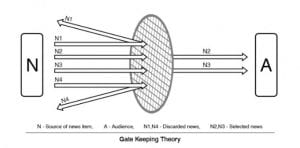As a PR professional, who has worked in the financial and energy sectors for large corporate companies for most of her career, I see part of my role as a gatekeeper of information. In my role, I select and shape news messages (Shoemaker and Reese, 1996; Shoemaker and Vos,2009) and exercise caution and discretion in terms of the news and information that should and shouldn’t be promoted on behalf of the company I work for.
I identify this as an application of gatekeeper theory, first proposed by social psychologist Kurt Lewin in 1947, and then expanded upon by David Manning White in the 1950’s study who undertook a study of how editors selected which messages and news articles were published.
Journalists and editors are also gatekeepers today, being selective about what they want to write and what angle they want to position in their article. The graphic below shows that the news produced is then selected by a gatekeeper and only certain items of news is then disseminated to audiences.
Prior to social media, the gatekeeper was a key influencer in the type of news that was published and was one of the main influencers in society, able to set agendas, whether they be politically or socially driven.
However, I think that social media has really changed this influence and through online media channels, the number of gatekeepers has multiplied to untold numbers, who are not affiliated or connected to the particular organisation or news publishing outlet. This means they are independent gatekeepers who can comment, reshape articles, criticise, or write and publish opposing information published by organisations and traditional media online.
I conclude that in terms of PR, the traditional gatekeeper of news is still in existence but the power of news outlets and or corporate organisations has diminished in terms of the selecting and shaping messages disseminated to the masses and that organisations now need to consider the multitude of gatekeepers out in the digital sphere who also set agendas, shape messages and influence publics.


